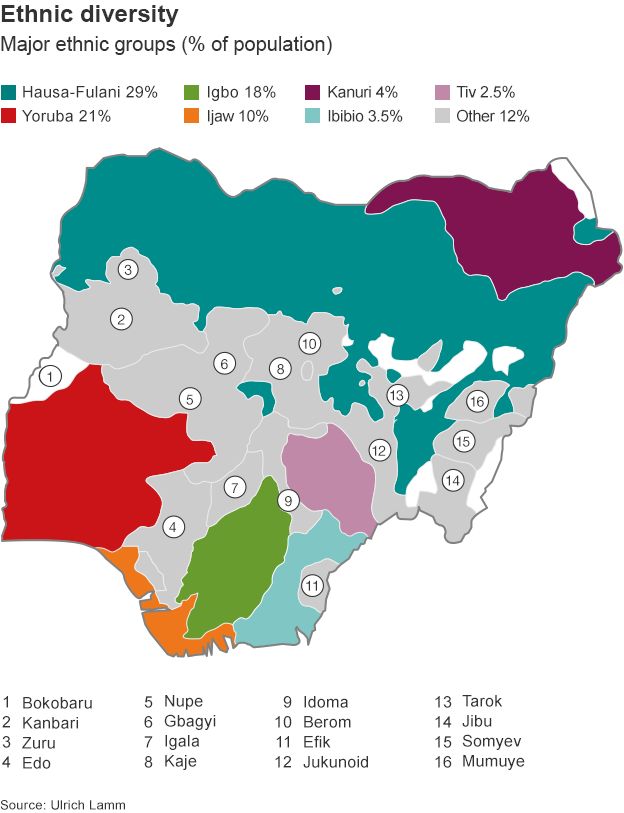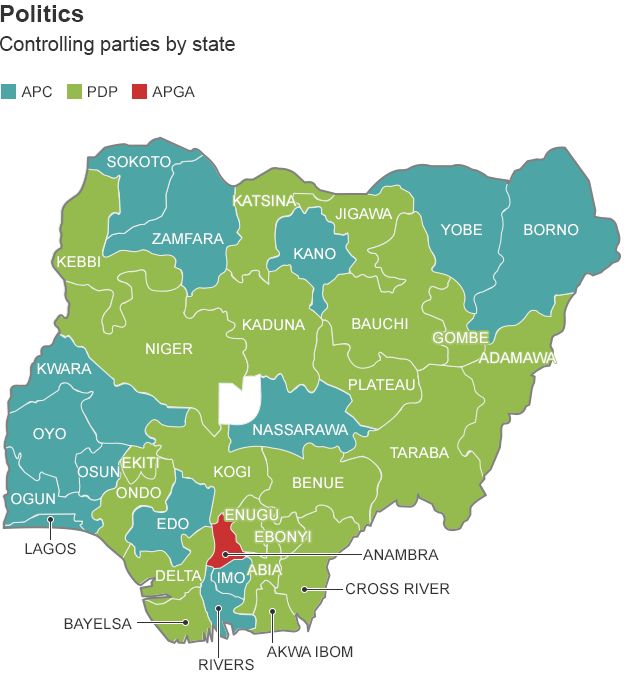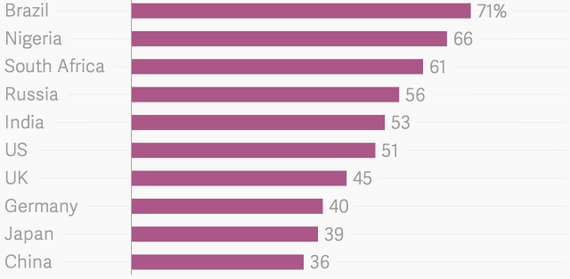Nigeria is Africa’s biggest oil producer and most populous country – but poverty is widespread and the country is in the grip of a violent uprising by Islamists Boko Haram. The BBC maps the country’s divisions ahead of its postponed elections.


Nigeria is Africa’s biggest oil producer and most populous country – but poverty is widespread and the country is in the grip of a violent uprising by Islamists Boko Haram. The BBC maps the country’s divisions ahead of its postponed elections.



How People Spend Their Time on the Internet

“I called him Goodluck because although life was hard for me when he was born, I had this feeling that this boy would bring me good luck,” his late father Lawrence Jonathan was quoted as saying in a recent biography of the president.
His mother Eunice said although she had a history of lengthy labour in childbirth stretching for several days, Goodluck was born in record time – the very day she went into labour.
But the plot thickens. The 53-year-old leader has benefited from a series of events that have advanced his career by default.
He became governor of his native Bayelsa state in 2005. He had been deputy governor and took over the office after his predecessor was impeached on money laundering charges.
A couple years later, he was selected to run as vice president under Umaru Yar’Adua, a northerner who needed to balance his ticket.
Yar’Adua dies in office after months of illness, and Jonathan is sworn in to replace him.
And then April 2011: The power of incumbency behind him, Jonathan easily wins the presidential election.
Despite evidence of homosexual customs pre-dating the colonial era, intolerant laws are flourishing across Africa.
After news broke that President Goodluck Jonathan had on January 7 signed the Same-Sex Marriage Prohibition bill, unanimously approved by lawmakers in May 2013…
While condemned by the likes of the United Nations and the European Union, the law is praised by a majority of Nigerians, who have united under a banner of patriotism and what many perceive as a fight against Western imperialism. The president’s spokesperson reportedly stated that the law “reflects the religious and cultural preferences of the Nigerian people”.
A 2013 Pew survey that interviewed adult Nigerians found that 98 percent of respondents agreed that homosexuality “should not be accepted into society”…
Amnesty International reported that 16 African countries do not have criminal laws against homosexuality, whereas 38 have made it illegal…
“We don’t ask the Europeans to be polygamists,” President Macky Sall told US President Barack Obama in 2013. “We like polygamy in our country, but we can’t impose it in yours. Because the people won’t understand it. They won’t accept it. It’s the same thing.”
In a quarter-century, at the rate Nigeria is growing, 300 million people — a population about as big as that of the present-day United States — will live in a country roughly the size of Arizona, New Mexico and Nevada.
Nigeria’s unemployment rate is nearly 50 percent for people in urban areas ages 15 to 24 — driving crime and discontent.

Nigeria made contraceptives free last year, and officials are promoting smaller families as a key to economic salvation, holding up the financial gains in nations like Thailand as inspiration.
Nigeria, already the world’s sixth most populous nation with 167 million people Muriana Taiwo, 45, explained that it was “God’s will” for him to have 12 children by his three wives, calling each child a “blessing” because so many of his own siblings had died.![]()
![]()
Under Lagos’s energetic governor, much lauded in the international financial media, this crowded megalopolis of high rises, filthy lagoons, fierce traffic jams and sprawling slums, home to perhaps 21 million people, has proclaimed its ambition to become the region’s, if not Africa’s, premier business center.
Infrastructure and housing projects abound, including a light-rail network whose trestles already vault crowded neighborhoods, and a vast upmarket Dubai-style shopping and housing development built out into the Atlantic Ocean, inaugurated last week by former President Bill Clinton. A new Porsche dealership has opened in the financial district.
In this gleaming vision, the old Lagos of slums has an uncertain future. Two-thirds of the city’s residents live in “informal” neighborhoods, as activists call them, while more than one million of the city’s poor have been forcibly ejected from their homes in largely unannounced, government slum clearances over the last 15 years.
Many said they were given 20 minutes, at most, to pack up their belongings.
Who are Nigeria’s Boko Haram Islamists?
Boko Haram kills 67 in northeast Nigeria
Abubakar Shekau is the leader of the militant Islamist group Boko Haram, which has carried out a series of deadly attacks across northern Nigeria. Abdullahi Tasiu Abubakar from the BBC Hausa service looks at Nigeria’s most wanted man, who has been designated a terrorist by the US government.
Nigeria’s military has killed a top commander of militant Islamist group Boko Haram in the north-eastern city of Maiduguri, an army spokesman has said Nigerian troops have opened fire and burned buildings in the north-eastern city of Maiduguri, reportedly killing 30 civilians.
The Anglo-Dutch oil giant Shell has rejected claims by four Nigerian farmers that it should pay compensation for damage to their land.
Coming nearly a week after radical sect Boko Haram set off a series of bombs across Nigeria on Christmas Day, including one at a church that killed at least 37 people and wounded 57, Jonathan told state television the measures would aim to restore security in troubled parts of Nigeria’s north.
Islamist spokesmen and leaders of the revived Islamist mainstream are bending over backwards to give reassurances that they will promote a peaceful, pluralistic and tolerant version of Islam. The rights of women and religious and ethnic minorities will be respected, they say, and the people’s democratic verdict will be accepted if they lose elections.
Whatever their doubts, most democrats in the Arab world reckon that Islamists who say they will abide peacefully by the rules of the game must be allowed—indeed encouraged—to participate in mainstream politics: far better than forcing them into a violent, conspiratorial underground. All the same, the well of mistrust on both sides runs deep.
Many liberals still think the Islamists, however mild they sound today, are bent on taking over in the long run, would abandon democracy once they got into power and would use every sort of chicanery and violence to achieve their goal.
Two articles on the relationship between Islam and democracy in light of the 2011 “Arab Spring”
Can the new government of Goodluck Jonathan clean up corruption and set enterprise free in Africa’s most populous country?
With Mr Jonathan’s inauguration on May 29th, and the formation of a new government, many expect a turnaround. Two-thirds of Nigerians think the election will change their lives, according to a poll conducted by the International Republican Institute, an American outfit that promotes democracy. “We dream,” says a girl shining shoes. “What else can we do?”
The ruling People’s Democratic Party (PDP) is facing its first competitive elections since taking power when democracy was restored in 1999 after a long spell of military rule. Mr Jonathan, who assumed office a year ago following the death of his predecessor, may have to compete in a run-off against his main opponent, Muhammadu Buhari, a former military ruler and ex-PDP member. Even if Mr Jonathan wins in the first round on April 16th (by getting at least 50% of the total vote plus 25% or more in at least two-thirds of the federal states) his party is likely to lose ground. It is expected to do badly in parliamentary polls on April 9th and governors’ contests on April 23rd. That would mark a shift in Nigerian power, away from the PDP.
Many voters are disgusted with the rapaciousness of Africa’s biggest political party. Much of the country’s $400 billion in oil revenues earned during its time in office has ended up in the hands of a small elite. Only a sixth of the population of 150m lives on more than $2 a day. Critics sneeringly call the PDP the “poverty development party” and say it has “more skeletons in its cupboards than rested souls at Lagos’s Atan Cemetery”.
It took President Goodluck Jonathan a mere decade to go from lowly official to undisputed leader of his country. He became president by default a year ago and has now clinched the nomination for presidential candidate in Nigeria’s ruling People’s Democratic Party (PDP) by winning 77% of the vote in a primary on January 14th. He is now the favourite to triumph at a poll due in April.
…Nigerians are far from certain what lies ahead. Africa’s most populous country and biggest energy producer, Nigeria is the continent’s giant, with 150m people, over 250 ethnic groups and at least 36 billion barrels of proven oil reserves. Yet it is also known for a level of chaos and corruption that makes other Africans raise their eyebrows at the mention of its name. A string of military and civilian leaders have embezzled the country’s oil wealth rather than investing in basic infrastructure. The chasm between rich and poor fuels militant gangs in the oil-rich southern delta and Islamist sects in the arid north.
Is he strong enough to tell those cronies that the party’s over?
It is hard to avoid Nigerian films in Africa. Public buses show them, as do many restaurants and hotels. Nollywood, as the business is known, churns out about 50 full-length features a week, making it the world’s second most prolific film industry after India’s Bollywood. The Nigerian business capital, Lagos, is said by locals to have produced more films than there are stars in the sky. The streets are flooded with camera crews shooting on location. Only the government employs more people.
Nigerian films are as popular abroad as they are at home. Ivorian rebels in the bush stop fighting when a shipment of DVDs arrives from Lagos. Zambian mothers say their children talk with accents learnt from Nigerian television. When the president of Sierra Leone asked Genevieve Nnaji, a Lagosian screen goddess, to join him on the campaign trail he attracted record crowds at rallies. Millions of Africans watch Nigerian films every day, many more than see American fare. And yet Africans have mixed feelings about Nollywood.
Check out this analysis of the Nigerian film industry
ELECTIONS next April are already casting long shadows in Nigeria. The ruling People’s Democratic Party (PDP) is set to hold a presidential primary next month with a victor to be announced by January 15th. A powerful challenger to Goodluck Jonathan, the incumbent, has emerged. A bout of frantic politicking is certain.
Read about the Abubakar vs. Goodwill Jonathan struggle for Nigeria’s presidency.
A free-for-all fight broke out on the floor of the Nigerian House of Representatives on June 22, 2010. It arose as members who opposed to the embattled speaker of the house, Dimeji Bankole, tried to introduce a motion for his impeachment.
Watch a video of Basil Omiyi, Shell’s Country Chair in Nigeria, who was at the United Nations in New York attending a pan-African investment round-table. He spoke to Paolo Black about some of the challenges facing Nigeria and Shell’s operations there.
Courtesy of Shell Worldwide Inc. Thank you Shell. Ugh.
As militants lay down their arms in the Niger Delta, the battle is on to tackle Nigeria’s other massive ills…
Over the past three months the militants have been giving up both themselves and their guns in unprecedented numbers. The federal government has promised them an unconditional pardon for past crimes, a small stipend to live on and the promise of retraining in order to “reintegrate” into society.